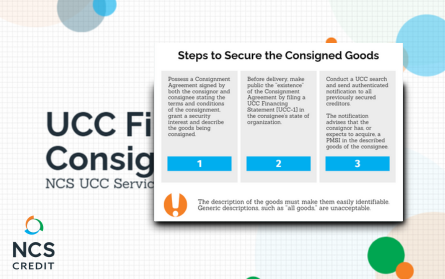
Introducing the Debtor Payment Portal
In this NCS Extra Credit installment, Pete Pozzuto (Business Development Representative) discusses the Debtor Payment Portal with Jerry Bailey (Executive Sales and Education Services Manager).

The Advantages of Secured Collections
In this NCS Extra Credit installment, Pete Pozzuto (Business Development Representative) discusses the advantages of secured collections.

Protect Your Consignment Sales with UCC Filings
Do you allow allow customers to possess goods under a “consignment” agreement prior to the actual sale? Learn about the importance of filing a UCC to protect your interest.

Protect Your Purchase Money Security Interest (PMSI) in Inventory
Section 9-103 of the UCC defines a PMSI as a security interest in goods (aka inventory) that are collateral for an obligation that arises in connection with the sale of the goods.
When the required steps are met, a PMSI can give a creditor a first or priority security interest in the goods, even if other secured parties hold prior perfected security interests in the same collateral.
Check out this infographic to learn more about who might benefit from a PMSI in Inventory and how to comply with PMSI requirements.

A Review of NCS' Flat Fee Collection Services
In this NCS Extra Credit installment, Pete Pozzuto (Business Development Representative) discusses NCS' Flat Fee Collection Services.

North Carolina's Notice to Lien Agent
North Carolina had a “hidden lien” problem with construction projects. The mechanic’s liens weren’t hiding under bushes or behind trees, but rather hiding from future property buyers and lending companies. So, the North Carolina legislature came up with a solution: the Lien Agent.
The Lien Agent is a designated party, for each private construction project, who must receive notification from any contractor or subcontractor supplying materials or labor to said project.
Is the notice served on the Lien Agent the same as the notice served on the subcontractor? Check out this infographic for the answer!

Supplying to the Foodservice or Hospitality Industries? Protect Your Company with UCC Filings.
The foodservice industry is on track to lose $240 billion in sales by the end of 2020. As a creditor supplying goods, equipment, or services to the foodservice industry, how can you reduce your credit risk? UCCs.
In this article, you will learn the basics of UCC filings, the important role UCC filings play in these industries, which UCC filing is right for you and what steps to take in the event your customer defaults and/or sells the business when you have a UCC in place.

The Benefits of Secured Transactions and the Uniform Commercial Code (UCC)
Article 9 of the Uniform Commercial Code provides an opportunity for trade creditors, like you, to secure your goods by utilizing the personal property assets of your customer. Learn more about the benefits of UCC filings and how they can protect your receivable if your customer defaults or files for bankruptcy protection.

When Should I Consider Amending My Preliminary Notice?
If you serve a preliminary notice, there are pieces of information within the notice that are statutorily required. If that information changes and you have already served your notice, you may need to resend the notice. Download this resource to learn more.

